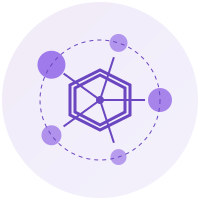LLM#
The LLM module in Datatune provides classes for interfacing with various Language Model providers. It handles the connection to and inference from LLMs with a unified API structure, supporting both single and batch inference, with the help of LiteLLM.
Base LLM Class#
The base LLM class provides the foundation for working with different LLM providers.
from datatune.llm.llm import LLM
# Initialize with OpenAI model
llm = LLM(model_name="openai/gpt-3.5-turbo")
# Process a single prompt
response = llm("Extract the city name from: '123 Main St, New York, NY 10001'")
# Process multiple prompts in batch
responses = llm(["Extract city from: 'NY, USA'", "Extract city from: 'Paris, France'"])
Parameters#
model_name (str, required): The identifier for the LLM model to use.
temperature (float, optional): Controls randomness in output generation. Defaults to 0.0 for deterministic results.
kwargs: Additional parameters to pass to the underlying LLM provider.
Specialized LLM Providers#
Ollama#
The Ollama class provides an interface to locally hosted models via Ollama.
from datatune.llm.llm import Ollama
# Initialize with default parameters (gemma3:4b on localhost)
llm = Ollama()
# Or specify a different model and endpoint
llm = Ollama(
model_name="llama3:15b",
api_base="http://ollama-server:11434"
)
Parameters#
model_name (str, optional): The model to use. Defaults to “gemma3:4b”.
api_base (str, optional): The base URL for the Ollama API. Defaults to “http://localhost:11434”.
kwargs: Additional parameters to pass to the Ollama API.
Azure#
The Azure class provides an interface to Azure OpenAI models.
from datatune.llm.llm import Azure
import os
# Initialize with Azure configuration
llm = Azure(
model_name="gpt-35-turbo",
api_key=os.getenv("AZURE_API_KEY"),
api_base=os.getenv("AZURE_API_BASE"),
api_version=os.getenv("AZURE_API_VERSION")
)
Parameters#
model_name (str, required): The name of the deployed model in Azure.
api_key (str, optional): The API key for Azure OpenAI. If None, will try to use environment variables.
api_base (str, optional): The base URL for the Azure OpenAI API.
api_version (str, optional): The API version to use.
kwargs: Additional parameters to pass to the Azure API.
Usage in Datatune Operations#
LLM instances are passed to Datatune operations like Map and Filter:
from datatune.core.map import Map
from datatune.llm.llm import LLM
import dask.dataframe as dd
# Initialize LLM
llm = LLM(model_name="openai/gpt-3.5-turbo")
# Load data
df = dd.read_csv("data.csv")
# Use LLM with a Map operation
mapped_df = Map(
prompt="Extract company name from the text",
output_fields=["company_name"]
)(llm, df)
Gemini#
The Gemini class provides an interface to Google’s Gemini models.
from datatune.llm.llm import Gemini
import os
# Initialize with Gemini configuration
llm = Gemini(
model_name="gemma-3-1b-it",
api_key=os.getenv("GEMINI_API_KEY")
)
Parameters#
model_name (str, optional): The name of the Gemini model to use. Defaults to “gemini/gemma-3-1b-it”. The “gemini/” prefix is automatically added if not present.
api_key (str, optional): The API key for Google’s Gemini API. If None, will try to use environment variables.
kwargs: Additional parameters to pass to the Gemini API.
Model Name Handling#
The Gemini class automatically prefixes model names with “gemini/” if not already present. This means you can specify either:
model_name="gemma-3-1b-it"(prefix added automatically)model_name="gemini/gemma-3-1b-it"(prefix already present)
Example#
from datatune.core.map import Map
from datatune.llm.llm import Gemini
import dask.dataframe as dd
# Initialize LLM
llm = Gemini(model_name="gemma-3-1b-it")
# Load data
df = dd.read_csv("data.csv")
# Use LLM with a Map operation
mapped_df = Map(
prompt="Extract company name from the text",
output_fields=["company_name"]
)(llm, df)
Mistral#
The Mistral class provides an interface to Mistral AI’s models.
from datatune.llm.llm import Mistral
import os
# Initialize with Mistral configuration
llm = Mistral(
model_name="mistral-tiny",
api_key=os.getenv("MISTRAL_API_KEY")
)
Parameters#
model_name (str, optional): The name of the Mistral model to use. Defaults to “mistral-tiny”. Available models include:
“mistral-tiny”
“mistral-small”
“mistral-medium”
“mistral-large”
api_key (str, optional): The API key for Mistral AI. If None, will try to use environment variables.
kwargs: Additional parameters to pass to the Mistral API.
Example#
from datatune.core.map import Map
from datatune.llm.llm import Mistral
import dask.dataframe as dd
# Initialize LLM
llm = Mistral(model_name="mistral-tiny")
# Load data
df = dd.read_csv("data.csv")
# Use LLM with a Map operation
mapped_df = Map(
prompt="Extract company name from the text",
output_fields=["company_name"]
)(llm, df)
Huggingface#
The Huggingface class provides an interface to Hugging Face’s models.
from datatune.llm.llm import Huggingface
import os
# Initialize with Huggingface configuration
llm = Huggingface(
model_name="meta-llama/Llama-2-7b-chat-hf",
api_key=os.getenv("HF_TOKEN")
)
Parameters#
model_name (str, required): The name of the Hugging Face model to use. The “huggingface/” prefix is automatically added if not present.
api_key (str, optional): The API key for Hugging Face. If None, will try to use environment variables.
kwargs: Additional parameters to pass to the Hugging Face API.
Model Name Handling#
The Huggingface class automatically prefixes model names with “huggingface/” if not already present. This means you can specify either:
model_name="meta-llama/Llama-2-7b-chat-hf"(prefix added automatically)model_name="huggingface/meta-llama/Llama-2-7b-chat-hf"(prefix already present)
Example#
from datatune.core.map import Map
from datatune.llm.llm import Huggingface
import dask.dataframe as dd
# Initialize LLM
llm = Huggingface(model_name="meta-llama/Llama-2-7b-chat-hf")
# Load data
df = dd.read_csv("data.csv")
# Use LLM with a Map operation
mapped_df = Map(
prompt="Extract company name from the text",
output_fields=["company_name"]
)(llm, df)
